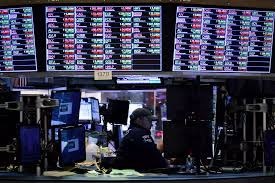
Economic shocks are an inevitable part of the global business landscape.
Whether it’s a sudden market downturn, geopolitical tensions, or trade disruptions, businesses and investors must be prepared to weather the storm.
For Zimbabwean investors with exposure to US markets, the current environment of escalating tariffs and trade tensions presents both challenges and opportunities.
This article explores how to build long-term resilience during economic shocks, with a specific focus on the impact of tariffs on Zimbabwean investors in US markets.
Understanding economic shocks and their impact
Economic shocks are unexpected events that disrupt markets, economies, or industries.
These can include natural disasters, political instability or as we’re seeing now, trade wars and tariffs.
For Zimbabwean investors, the ripple effects of these shocks can be particularly pronounced due to the interconnected nature of global markets.
- Ex-Q, Winky D, Baba Harare head for Odyssey
- Music teacher celebrates African heritage
- Ex-Q, Winky D, Baba Harare head for Odyssey
- Byo singer elated at playing on African music charts
Keep Reading
The recent imposition of tariffs by the US and retaliatory measures by China have created a volatile trading environment.
Tariffs increase the cost of goods, disrupt supply chains, and can lead to reduced consumer spending.
For Zimbabwean investors in US markets, this means heightened uncertainty and potential risks to their portfolios.
The impact of tariffs on Zimbabwean investors in US markets
Tariffs are taxes imposed on imported goods, and they can have far-reaching consequences. For Zimbabwean investors with stakes in US markets, here’s how tariffs might play out:
Increased costs for US companies: Tariffs raise the cost of imported goods, which can squeeze profit margins for US companies reliant on global supply chains.
This could lead to lower stock prices for affected companies, impacting the value of investments.
- Market volatility: Trade tensions often lead to market volatility. For Zimbabwean investors, this means their US-based investments could experience sudden price swings, making it harder to predict returns.
- Currency fluctuations: Tariffs can influence currency values. A stronger US dollar might make US investments more expensive for Zimbabwean investors, while a weaker dollar could reduce returns when converting profits back to local currency.
- Sector-specific risks: Certain sectors, like technology and industrials, are more exposed to tariffs due to their reliance on global supply chains. Zimbabwean investors with concentrated positions in these sectors could face higher risks.
Strategies for building long-term resilience
While tariffs and economic shocks pose challenges, they also present opportunities for those who are prepared. Here are five strategies Zimbabwean investors can adopt to build long-term resilience:
- Diversify your portfolio: Diversification is one of the most effective ways to mitigate risk. By spreading investments across different asset classes, sectors, and geographic regions, you can reduce the impact of any single economic shock.
Geographic diversification: Don’t put all your eggs in one basket. Consider investing in emerging markets or regions less affected by US-China trade tensions.
Sector diversification: Balance your portfolio with exposure to defensive sectors like healthcare and consumer staples, which tend to perform well during economic downturns.
- Strengthen cash flow management: In times of uncertainty, cash is king. Ensure you have sufficient liquidity to weather market downturns and take advantage of opportunities as they arise.
Cut non-essential costs: Review your expenses and eliminate unnecessary spending.
Renegotiate supplier terms: If you’re running a business, renegotiate payment terms with suppliers to improve cash flow.
- Invest in technology and automation: Technology can be a game-changer during economic shocks. Automation can improve efficiency, reduce costs, and minimise dependency on volatile inputs.
Adopt digital tools: Use software to streamline operations and enhance decision-making.
Leverage data analytics: Analyse market trends and customer behavior to make informed investment decisions.
- Focus on customer retention: During tough times, retaining customers is more cost-effective than acquiring new ones. Deliver value and maintain strong relationships to ensure loyalty.
Enhance customer experience: Offer personalised services and address customer concerns promptly.
Communicate transparently: Keep customers informed about how you’re navigating challenges.
- Stay agile and adaptable: The ability to pivot quickly is crucial in a volatile environment. Regularly review your strategy and be prepared to adapt to changing conditions.
Monitor market trends: Stay informed about global developments and their potential impact on your investments. Reassess risk tolerance: Adjust your portfolio to align with your risk appetite and financial goals.
The role of tariffs in shaping investment strategies
For Zimbabwean investors, understanding the impact of tariffs is key to making informed decisions. Here’s how tariffs can shape your investment strategy:
Defensive positioning: If tariffs lead to broader economic weakness, consider shifting to defensive stocks or sectors that are less sensitive to economic cycles.
Opportunities in emerging markets: Tariffs might encourage companies to diversify supply chains away from Canada, creating opportunities in other emerging markets.
Currency hedging: Protect your portfolio from currency fluctuations by using hedging strategies.
A call to action for Zimbabwean investors
Navigating the complexities of tariffs and economic shocks requires a proactive approach. By diversifying your portfolio, managing cash flow, investing in technology, focusing on customer retention, and staying agile, you can build long-term resilience and thrive in uncertain times.
For a deeper dive into the impact of tariffs on US markets and how Zimbabwean investors can adapt, watch my detailed video on Impacts of Tariffs on Streetwise Economics YouTube channel.
The video provides actionable insights and strategies to help you make informed decisions in this evolving economic landscape.
In conclusion, economic shocks and tariffs are inevitable, but they don’t have to derail your financial goals.
By adopting a resilient mindset and implementing the strategies outlined above, Zimbabwean investors can not only survive but also thrive in the face of adversity.
Remember, the key to long-term success lies in preparation, adaptability, and continuous learning.
Let’s navigate these challenges together and emerge stronger! Until next time, trade and invest wisely!
- *Isaac Jonas is a Canada-based economist and principal consultant at Streetwise Economics. He is also a retail investor, retail trader and content creator, focusing mainly on the US and Canadian capital markets. He regularly shares insights via his social media handles and YouTube channel (Streetwise Economics). His website is www.streetwiseeconomics.com and can be reachable on isacjonasi@gmail.com. Insights shared in this article are based on current market conditions, which may be subject to change, hence this article does not amount to investment advice.










